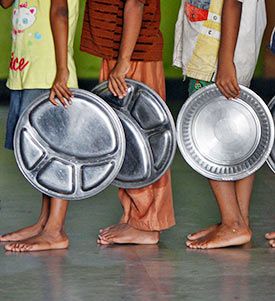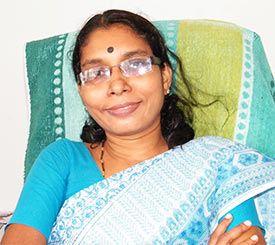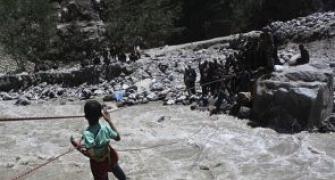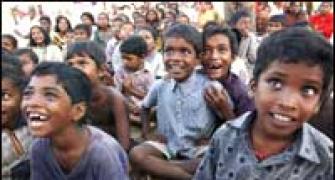 'When hundreds of children are being brought with no proper records and no adult accompanying them, why didn't the authorities find anything unusual? They travelled from far north till down south without anyone checking on them.
'When hundreds of children are being brought with no proper records and no adult accompanying them, why didn't the authorities find anything unusual? They travelled from far north till down south without anyone checking on them.
'Child rights violations have happened in a big way. When these little children are transplanted into an alien land where the culture, food and language are different, they become scared and lost. It is not right to tear children away from their parents and families even if they suffer from abject poverty.'
'Kerala is only the destination; the problem lies elsewhere. By focussing on the destination alone, you are not going to solve a major problem.'
J Sandhya, member, Child Rights Commission, speaks to Shobha Warrier about the recent incident where more than five hundred poor children from Jharkhand, Bihar and West Bengal were being sent to Kerala orphanages, and why children's rights need to be protected with vigour.
On May 24-25, 589 children from very poor families in Jharkhand, Bihar and West Bengal arrived in Kerala by train. Alerted by some passengers at Erode, they were detained by the railway police at Palakkad Junction.
The first batch of 466 children from Bihar and Jharkhand came by the Patna-Ernakulam Express; the second batch of 123 children came from West Bengal by the Guwahati-Thiruvananthapuram Express.
Most of the children did not have valid documents.
The first batch of children were said to be inmates of the Mukkam Muslim Orphanage in Kozhikode; the second were headed for an orphanage at Vettathur in Malappuram district.
The Kerala police arrested eight persons under Section 370(5) of the Indian Penal Code on the charge of trafficking children below the age of 12.
In no time, a team of five senior labour officers arrived from Jharkhand and said the children were victims of child trafficking.
In this interview with Shobha Warrier/Rediff.com, child rights activist and member, Child Rights Commission, Advocate J Sandhya (left, below) looks at the incident from a larger perspective:
As a member of the Child Rights Commission, how do you look at the incident where nearly 600 children were being trafficked? The labour officials from Jharkhand who came here confirmed it was a case of child trafficking.
We had gone to Palakkad to meet the children and speak to them. We also spoke to the people who were expected to house these children and to all the officials. After studying the incident, we are of the opinion that there has been a huge violation of child rights.
As a child rights activist, I feel we have to look at the incident from a larger perspective. By arresting a few people, you have not addressed the issue properly.
Kerala is only the destination; the problem lies elsewhere. By focussing on the destination alone, you are not going to solve a major problem.
It is good that the Kerala government did whatever it could to make the stay of the children comfortable. Now, everybody is happy that we have sent the children back home.
As a child rights activist, my question is: Have you solved the problem by doing so? They are going back to the same situation that forced them to be herded to an unknown place like Kerala.
We have not made any changes at the place where their journey started. After a few days, they may be sent elsewhere.
What was the condition of the children when you spoke to them? What did they tell you?
When we went there, we saw a hall full of children. I was in tears seeing their sad, lost faces.
Some of them were lying on the floor, all curled up. Some had fever. Some were crying. When I asked the little ones who were crying what they wanted, they said, ‘Ghar jaana hai (We want to go home).
When I told them somebody would come with the tickets very soon, they said, 'You are lying. Yesterday also somebody told us they would come with tickets but nobody came'. They seemed to have lost faith.
The orphanages argue that they are giving food, shelter and education to these poor children. The question is: Can't they help these children there itself instead of taking them away from their land, parents and family?
That’s why I say child rights violations have happened in a big way. When these little children are transplanted into an alien land where the culture, food and language are different, they become scared and lost. They are also away from their dear and near ones.
It is not right to tear children away from their parents and families even if they suffer from abject poverty.
It is the basic duty and responsibility of the state to make the correction at the source itself. If you help them there with proper food and education, these children will not feel lost.
Children should be with their families. If the state can't do everything, let it give the right opportunities to the NGOs.
A child should grow up with his or her family. Institutionalisation should be the last resort.
Even the Juvenile Justice Act says that children shouldn't be in institutions. They should live in the surroundings they are familiar with. I would say, if these orphanages have enough resources, let them do it at the place where the children belong.
The United Nations Child Convention says every child has a right to live in his own surroundings. We should adhere to that.
 What can the Child Rights Commission do in a case like this?
What can the Child Rights Commission do in a case like this?
At the Child Rights Commission in Kerala, we have our limitations. We can't interfere with what happens in another state. We intervened and made the lives of all the children comfortable when they were here.
I have been saying at all forums that the Juvenile Justice Act of 2000 is applicable to the whole country. Why is it that the lives of (such) children are neglected? Why are they exploited? Why are they not taken care of? They live in abject poverty.
While the officials from the orphanages deny child trafficking, the labour officials from Jharkhand confirmed that it was indeed child trafficking...
The Commission has not come to the conclusion that it was a case of child trafficking. We couldn't come to such a conclusion after talking to these children. It is for the police to investigate and find out whether it was really child trafficking.
The people who brought them here say this was not done to exploit the children but to provide them with education. We have to find out whether this was true and whether the children were exploited.
Do you feel there is something fishy about the way hundreds of children were brought here?
It is true that there is no transparency in the way these orphanages are run.
Those who are outside have a version about what is happening inside these orphanages and those who run them have another version, but nobody knows what exactly happens inside. That is why there are all sorts of rumours about the way they function.
Is it right to allow such organisations so much much secrecy?
Definitely, it is not right. There shouldn't be any secrecy. There should be transparency in the way they are run.
If the government wants to ensure transparency, there should be proper registration under the Juvenile Justice Act.
The Child Rights Commission has asked for a proper registration of all the orphanages.
In 2006, Parliament, through an amendment, mandated that all orphanages and children’s homes must be registered under the Juvenile Justice Act, but the orphanages run by religious intuitions in Kerala are yet to comply.
Ninety-five per cent of the 1,200 orphanages in Kerala are run by religious institutions. Why is it that these orphanages are not registered here?
They have a very funny defence. They say these children do not come under the purview of those who need care and protection as they are not strictly orphans. So, they argue that they do not have to register.
Kerala is the only state in India that has not implemented the Act. As per the 2006 Amendment, all orphanages are supposed to register within six months but they have not done so.
The Commission has taken a serious look at this issue. On April 28, we passed an order instructing all such institutions to register under the JJ Act within three months.
It is because there is no transparency that society is asking whether they are imparting religious studies or other such activities are taking place within their premises.
Another allegation we hear is that children are sent to other countries from these orphanages.
Yes, all this is because the state has no knowledge of what is happening inside the orphanages.
Who can see to it that there is transparency in the way the orphanages function?
It is the duty of the state government to see to it that they are registered under the JJ Act. Unfortunately, the Kerala state government has not done so yet.
It passed an order in 2010 saying registration is not compulsory for these orphanages. Our preliminary investigation showed that registration is not compulsory only in Kerala.
Recently, the Delhi high court criticised the Delhi government for not implementing the order. Every other state has made registration mandatory.
When you run an institution for children, there should be some ground rules and the state should have control over the orphanages. What is happening now is that the state has absolutely no control.
Why is there this resistance from the orphanages run by religious institutions?
Yes, there is unwanted resistance.
I don't know why they should fear state monitoring them or fear implementing the J J Act if their records are clear. In fact, they should come forward to register.
Unfortunately, in Kerala, when you debate on a rights issue, it becomes communal and politicised. Nobody is thinking about this from the child's point of view.
The children who were brought from Jharkhand, Bihar and West Bengal, had parents who were poor; they were not orphans. Why are they then taken to orphanages?
The Act says it is not just orphans who can be housed in the orphanages; destitute children can be housed there too provided they have the necessary certificates from the village officer.
The Child Rights Commission is trying to inspect all child care institutions as we have the right to do so. But the onus shouldn't rest with the commission alone; the state should look into this.
Did this incident come as a shock or were you aware something like this was happening here?
As a child rights activist, I was aware.
How long has this been happening?
For many years. As activists, we tried to intervene at the individual level with no success. That is why I am happy it has come out in the open.
Last year, I helped the Manipur government and the Child Welfare Committee there to take back 26 children who were stranded here.
After that, did you try to find out what exactly was happening in these orphanages?
Frankly speaking, I could only do very little; I was not able to go beyond a certain level.
It was in 2007 that I came to know these orphanages are not transparent. There was a case about a girl falling down from the third floor of an orphanage; she was admitted in a hospital. I found the condition of the girl such that it didn't look like a fall.
I filed a petition against the director of the orphanage under Section 23 of the Junior Justice Act asking for a proper enquiry into the accident. I faced abuse and resistance from the orphanage and her parents for pursuing the case. They didn’t want me to probe as they were dependant on the institution for the education of their children.
When a government officer went to investigate the case, he was not allowed inside the orphanage.
If you go to any orphanages here, they will remind you of jails with high walls and locked gates guarded by a security person. Even the local people don’t have any idea about what happens inside. Imagine, even a government officer was denied entry.
There are evident loopholes in the system and they are being exploited. What should be done to change the system and make everything more transparent?
Registration of all orphanages under the JJ Act must be made mandatory.
There should be constant monitoring of all orphanages by the Child Welfare Committee at the district level and they should have access to these orphanages. Only then, they can monitor what is happening inside and investigate when any child rights violation is reported.
There should be proper records of all children.
There should also be regular auditing of these agencies.
Railways must have a protocol for this as it is the first point from where all this starts.
My question is: When hundreds of children are being brought with no proper records and no adult accompanying them, why didn't the authorities find anything unusual? They travelled from far north till down south without anyone checking on them. They were only detained at Palakkad after some passengers made calls from Erode.
That is why I say this is not a problem that Kerala alone faces. This incident should be an eye-opener for the entire country; let this one be the last of this kind.
J Sandhya’s photograph: Shobha Warrier; lead photograph: Babu/ Reuters








